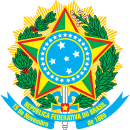
Back Etnografía de Brasil Spanish Composição étnica do Brasil Portuguese Brezilya'da ırk ve etnisite Turkish 巴西民族 Chinese
| Race |
|---|
| History |
| Society |
| Race and... |
| By location |
| Related topics |
| Part of a series on the |
| Culture of Brazil |
|---|
 |
| Society |
| Topics |
| Symbols |
Brazilian society is made up of a confluence of people of Indigenous, Portuguese, and African descent. Other major significant groups include Italians, Spaniards, Germans, Lebanese, and Japanese.[1]
Latin Europe accounted for four-fifths of the arrivals[when?] (2.25 million Portuguese,[2] 1.5 million Italians, and 700,000 Spaniards).
Brazil has seen greater racial equality over time. According to a recent review study, "There has been major, albeit uneven, progress in these terms since slavery, which has unfortunately not wholly translated into equality of income: only in 2011 did the black-to-white income ratio eclipse its 1960 level, although it appears to be at an all-time high. Education and migration were important factors in closing the gap, whereas school quality and discrimination may explain its persistence."[3]
- ^ Cite error: The named reference
msfl2was invoked but never defined (see the help page). - ^ "IBGE | Brasil: 500 anos de povoamento | território brasileiro e povoamento | portugueses". brasil500anos.ibge.gov.br. Retrieved February 5, 2023.
- ^ Bucciferro, Justin R. (January 1, 2017). "Racial Inequality in Brazil from Independence to the Present". In Bértola, Luis; Williamson, Jeffrey (eds.). Has Latin American Inequality Changed Direction?. Springer International Publishing. pp. 171–194. doi:10.1007/978-3-319-44621-9_8. ISBN 9783319446202.
© MMXXIII Rich X Search. We shall prevail. All rights reserved. Rich X Search